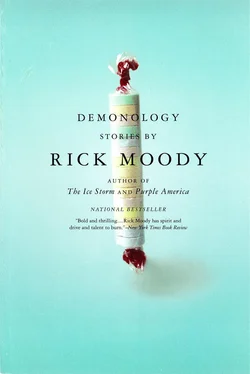— The Fremen were supreme in a quality the ancients called “spannungsbogen,” that’s what Muad’Dib says. He’s this guy… His name is Paul. He’s just a boy at the start of the story, but then he gets chosen, you know. First he’s the duke of the house of Atreides, after his dad dies, and then, well, he sort of goes after the post of emperor of, you know, the universe.
— Did you memorize the whole book?
— I’ve read it a bunch of times.
Upstairs, Linda Ronstadt came to an end and was replaced by the Eagles. Desperado, when will you come to your senses? An appallingly blond girl whom Gerry had never seen before peeked into the dining room so fleetingly that in recollection, it was more like a head floating into the space than anything else. Was she wearing a tutu? Or was it a lie of remembering?
— Dinah, can you just step back like one foot?
Dinah Polanski blushed horribly, as though he had stumbled upon a core failure in her short life and probed it callously, without respect. Yet at last she stepped back into the North American conversational range. What a relief.
— Frank Herbert was living up in the Oregon area, she said, — working as a newspaper reporter, and he had this vision of what humans would be like when Old Earth, that’s us here, you know, with our energy crisis, took off into, you know, into space. Must have been really something. One night he was writing advertising copy for ladies’ hats, and the next night he knew about Arrakis, the wasteland. It’s kind of romantic, I think. You have your home on this planet Earth, this little polluted dump, and you imagine your future home, a desert planet, out in space. It’s romantic.
Gerry was uncertain whether this observation of Dinah’s, in the backwater of the dining room, was coincidence — two teenagers in a room will inevitably begin talking about love and its idioms, no matter the manifest content of theirconversation. Was she secretly trying to tell him something, at last, trying to incite to the surface any recumbent possibilities? Maybe that spot under the table where she’d been hiding led somewhere, to a mattress. Since Julian Peltz never showed up after going off to drain the snake, Gerry had no choice but to presume that the romantic was the goal of the Halloween party. After all, love was the scariest thing. Love was the uncanny force that people recoiled from on Halloween. They made these costumes to stave off things and people who proposed the responsibilities of love. So Gerry seized the initiative. Who cared if Dinah had really thick glasses, because when she smiled she actually conveyed, you know, enthusiasm, which was pretty rare, and in contact lenses she might look kind of good, actually, like when she talked about things that actually interested her
— Dinah, want to kiss me?
An eternal and unbearable instant lingered between them.
— Are you trying to fool with me, Gerry Abramowitz? Because I’m not like all those kids at your keg parties and at your football games.
— I wasn’t —
— Because even if I followed you around when we were in grade school doesn’t mean anything now, because we’re older, and maybe we have other things to think about, like getting into good colleges. I’m not going to squander valuable time having meaningless encounters with boys. I’m going to think about early applications to the Big Three.
Gerry began to apologize, but in the midst of this apology the sliding doors to the library, on the north face of the dining room, swung back, as if according to plan, and with this coincidental opening, feelings of relief pulsed vitally in him. And Dinah said, Iwant to show you what the book looks like, and Gerry understood now that the book was in this instance an ideal category. Not the particular novel by Frank Herbert, but the book itself, the notion of the preservation of impressions of the past, the book as Ark of the Covenant. He couldn’t return in the direction he had come. That was timid. He had to continue pursuing the essence of the party through the house, and it was okay to take his imported German beer with him. Therefore, it was the library to which he came next, and the amazing thing, considering that Fosters’ old man edited some magazine featuring think pieces about the corrupt labor movement and the moral bankruptcy of the Left, was that the entire library was composed of rack-sized spy novels. Mysteries. Maybe an odd title on the theory of backgammon. Must have been hundreds of these paperbacks. Thousands, maybe. Dinah was his companion as he strode across this threshold, and immediately he could hear Fosters dad discoursing on subjects relating to Our disgraceful abandonment of the Shah in his hour of need, and likewise the inability of the American people to understand the aims of our involvement in Asia, the urgent need to oppose the dark purpose of the Eastern bloc wherever it arises. He was holding a drink, Foster’s old man, and wearing a tweed jacket, khaki trousers, white dress shirt, paisley bow tie. He was gesticulating with one of those extra-long cigarettes that was about to deposit its payload of ash on the floor. Gerry expected that Old Man Foster, in laying out his Cold War policy doctrine, would have adults as his audience, but there were no adults in the room. Instead, Nick Foster’s dad was talking to two guys playing Pong, that Pleistocene video game. There was an enormous television set in one corner of the den and these two teens were so deep into the couch there that they seemed to have been upholstered into it. The only free movement left to them was in their arms, by which they might control remotes.
For those not lucky enough to have experienced this old world home entertainment concept, it amounted to a reductio ad absurdum of all that is suggested by today’s video age. Each of two players controlled a small white oblong parallelogram on a vertical axis of the black television screen. Each attempted to hit a small white square with his vertically scrolling parallelogram so that it would carom back at the other guy. If one player missed and the square traveled to the edge of the screen, he lost. Very simple. This particular match, taking place between the two silent guys on the couch, had been going on at great length, perhaps since puberty. The square, the metaphoric tennis ball, went back and forth between the guys on the couch, neither of them acknowledging one another, neither of them acknowledging Foster’s old man, as he hypothesized: The decision to pardon the former president was a dramatic misstep, because the former president needed to stay and fight the charges against him, in order to vanquish the resistance of our American youth: the circular imperatives of Mr. Fosters soliloquy were ordered and ratified by the movement of the square back and forth and back and forth and back and forth and back and forth and back and forth and back and forth.
— Mister Foster, did you happen to see Julian Peltz come through here?
Gerry had seen cars out front. He knew there were people in here somewhere. He knew there were young people havingfun, and he knew there was a lightness of conversation, the riposte, the rejoinder, the one-liner, the shaggy dog story, the tangle of flirtation that came with talk. Happening all around him, happening wherever he, the Jewish kid, was not.
— The young women are upstairs. And the young men are not far away. Please don’t interrupt me now.
— Sorry, Mr. Foster.
He stepped around Foster’s dad, as though the old man were decorative. A number of paperbacks were stacked there, and these toppled. Early le Carré novels fanned out around the older mans feet. Mr. Foster picked up one of them, and with expert aim flung it into the fireplace, which even now, as Gerry watched, seemed to be robustly fueled with Trevanian and Robert Ludlum. At the far end of the den was another recessed divan, carved out of pink marble, and while the present action took place, a pair of girls from school motionlessly slept. It was essential for Gerry to investigate this phenomenon. Who were those girls exactly, and would it count, in the enumeration of conquests, if he kissed one of them on the lips?
Читать дальше












